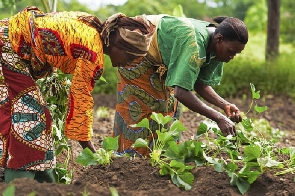Agriculture production in the five regions of the north is likely to be impacted negatively as the case count of COVID-19 continues to increase with consequences on agricultural performance.
Though experts such as Mr Francis Ennor, the Upper East Regional Director for Agricultural Services allayed the fears of farmers and urged them to cultivate more food this year, some of them and other stakeholders in agriculture are pessimistic to go further with their plans to engage manual labour on their farms.
Mr Mugmin Musah, the Head of Programme, GRAMEEN Ghana, in an interview with the Ghana News Agency in Bolgatanga, indicated that there was a likelihood that agriculture production this year would be low in the North because of general lack of funds and the scare of the COVID-19.
He said many farmers were finding it difficult to pay for manual labour and mechanization services and at the same time care for family members.
Mr Joshua Diedong, the Upper East Regional Officer of MoFA in charge of Crops, said farming in the area was time-bound and any interference along the Agriculture chain could impact negatively on productivity.
“Farmers are very sensitive about the marketing of their produce and since some suffered losses due to the lockdown as they could not transport their perishable products to sell, their earnings suffered and they cannot afford farm inputs for this season”, Mr Diedong stressed.
Mr Charles Nyaaba, a farmer decried the low market in the face of COVID- 19 and indicated that breweries that used to buy sorghum from them could not make it them due to the lockdown and the affected farmers could not afford to produce much this year.
He indicated that smallholder farmers relied solely on the proceeds of the previous year to continue producing and if that was not available then, they would not be able to do much.
My Nyaaba noted that there was no access to credit from agribusiness companies that used to provide the farmers financial services, “to make matters worse, only a few tractors are available to provide services to many farmers, creating high demand on the few available ones and directly impacting on land preparations.
Meanwhile, importation of tractors to augment the few was also hampered by the lockdown, he added.
Click to view details



Business News of Tuesday, 7 July 2020
Source: GNA

















